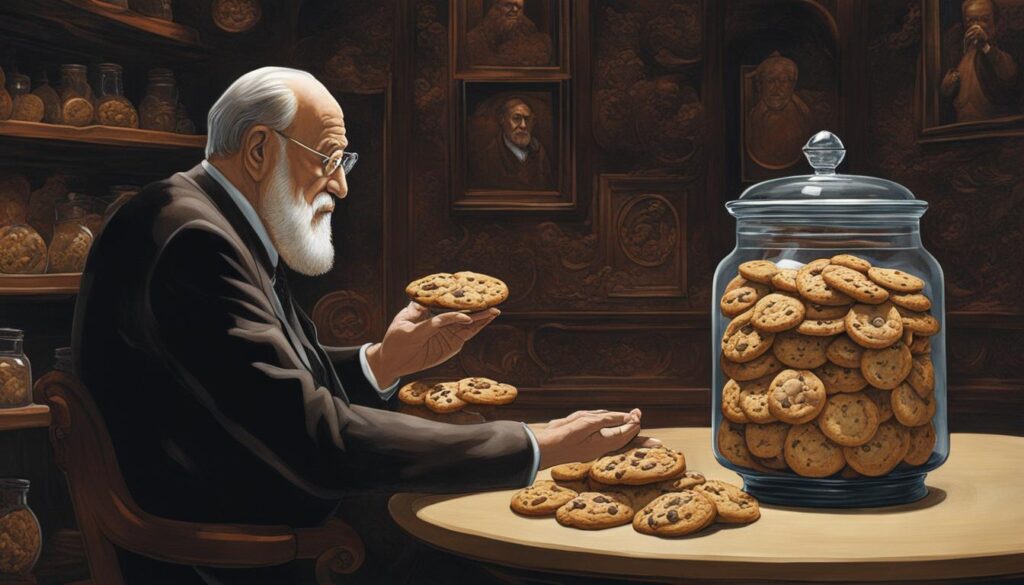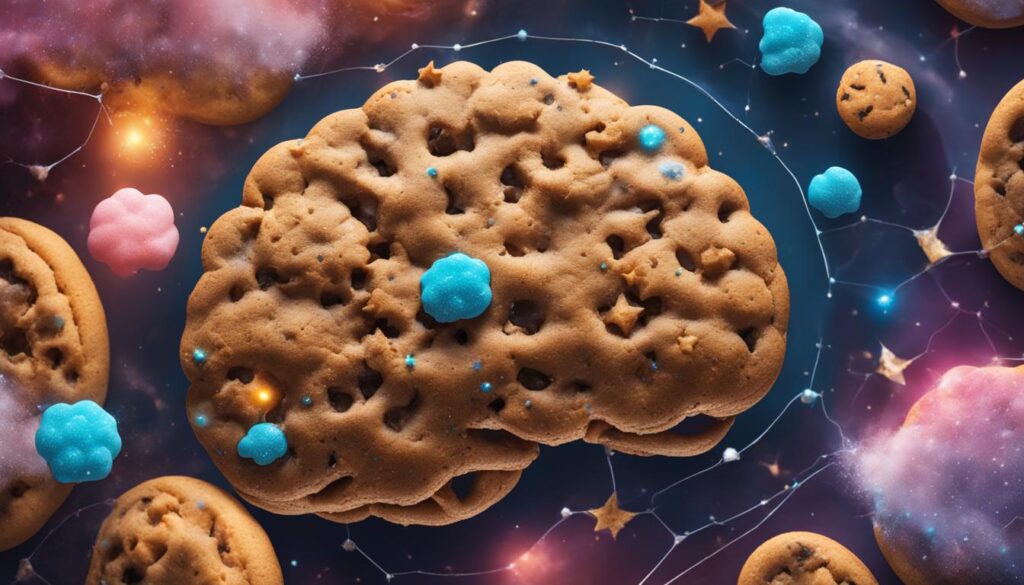Ever woken up with the lingering sweetness of a dream of cookies, feeling like it was more than just a mid-night trip to a virtual bakery? Pondering over the cookies dream meaning could uncover layers you didn’t realize your subconscious was baking. I’m here, not just to muse about these nocturnal treats, but to delve into what your brain is really up to when those delectable delights pop up in your dreams. Grab a cookie (or don’t, if you’re not into dream snacks), and let’s chew over the fascinating crumbs of dream interpretation together.
Key Takeaways
- Dreams about cookies could represent emotional memories and everyday experiences.
- Freud’s psychoanalytic theory suggests dreams, including cookie dreams, may signify wish fulfillment.
- Self-organization theory of dreaming interprets dreams as manifestations of psychological states.
- Different sleep stages, REM and NREM, contribute to distinct cognitive processes during dreams.
- Understanding vivid dreams of cookies could offer insights into our emotions and life events.
Unraveling the Sweet Subconscious: Exploring Cookie Dreams

Imagine you’re curled up in bed, and just before you drift to sleep, thoughts of cookies fill your mind. Maybe it’s a secret recipe you’re concocting or a memory of baking with a loved one. Then you enter the world of dreams where these sugary fantasies take on a life of their own. Understanding why you’re dreaming of cookies can be as deliciously complex as the cookies themselves.
As I peruse through the sweet labyrinth of the subconscious, two fundamental theories are on the menu: Freud’s psychoanalytic proposition and the self-organization theory of dreaming. The former nudges us to explore the labyrinth’s hidden paths – the concealed wishes that dreams of cookies might symbolize. The latter, however, sprinkles a different type of sugar on our mind’s nocturnal journey, blending fragments of our day-to-day experiences and emotions into a storyline – all while tucked beneath the blankets.
Take the self-organization theory, for instance; it doesn’t ask why cookies, but rather how the dream of cookies came to be. This perspective stirs up a concoction of emotional memories and the mundane crumbs of your day—the so-called “day’s residues”—all whisked together in the mixing bowl of your brain as it seeks rest and rejuvenation.
Fascinatingly, both the joy of a cookie and the act of dreaming one up share a recipe of combining elements—a mixture of memory, desire, and the subconscious.
Let’s cut through the cookie dough with some facts. These theories aren’t just idle speculation—they’re based on research and insight from psychologists and neuroscientists who’ve studied the meanings behind our dreams. And so, I set out to explore the subconscious meanings hidden within these nighttime cookie capers, with the hope of serving up some tasty insight.
But before you reach for the milk to dunk your dream cookie into, consider this: our dreams might be attempts by the mind to digest the day’s events, to make sense of the unsolved riddles posed by our waking hours. Isn’t it remarkable? As we lay sleeping, our subconscious is busy baking up narratives, leading us to a possible revelation of the day’s psychological leftovers.
- Are our cookie dreams simply a reflection of the day’s events?
- Could they be expressions of hidden desires or wishes, as Freud would suggest?
- Maybe they’re a side-effect of our mind tidying up our mental pantry as part of memory consolidation.
In this exploration, I’m not the dream-baker—I’m more the curious taster, keen on discovering and sharing the nuances concealed within these nocturnal indulgences. So, join me on this journey as we sift through the ingredients that make up the delicious enigma of dreaming of cookies.
Crunching on the Crumbs: What Do Cookie Dreams Really Say?

I’ve rolled up my sleeves to knead into the dough of our unconscious desires and night-time narratives.
The Emotional Ingredient: Affect and Memory in Dreams
Ever had that dream where you’re chasing the scent of freshly baked cookies through an enigmatic maze? I sure have, and it turns out those emotional memories in dreams are far more influential than I first surmised. Here’s a surprising sprinkle of information: our dreams often showcase a tapestry woven from emotional threads, rooted in both recent events and buried memories—yes, that includes Granny’s secret cookie recipe from our childhood!
Our dreams are like comfort food for the soul, a place where emotional echoes of our past are served up fresh, straight from the oven of our subconscious.
Let’s table this out. I’ve whipped up a quick comparison that’ll help us understand the interplay between different types of memories and how they surface in our dreams:
| Memory Type | Manifestation in Dreams |
|---|---|
| Newly Encoded Memories (Day’s Residues) | Recent events reappear, often mingled with wishful elements. |
| Dream-Lag Effect | Memories from a few days ago make a reappearance, often linked to current life situations. |
| Long-Term Memories | Fragments from the distant past, such as childhood, resurface, sometimes in symbolic forms. |
The Freudian Bite: Deciphering Dream Content
So, I’m munching on the perplexing cookie of Freudian thought. His take was that dreams, like a platter of assorted cookies, contain a sweet blend of manifest and latent dream content. He was convinced that every dream symbol, every chocolate chip, if you will, represented a concealed, unsatisfied wish. Now, I’m not the first to say it, but could my cookie dream really be me reaching for a crumb of unspoken desire? Food for thought.
Self-Organization in Sleep: How Dreams Bake Together
The notion of self-organization in dreams mixes things up by suggesting our brains are like midnight pastry chefs, effortlessly combining a dash of memory, a pinch of sensation, and spoonfuls of emotional spice into a cohesive dream narrative. Cognitive scientists say our sleeping brains aren’t just aimlessly sifting flour; they’re strategically organizing chaotic signals into something we can digest when we awaken.
- Every ingredient—be it memories from today or ancestral blueprints—is necessary for the dream’s final form.
- It’s not about exploring the pantry for hidden meanings, but savoring the recipe of consciousness that unfolds in our sleep.
Chew on this: Whether we’re deciphering the psychological flavor profile of a cookie dream with Freud or assembling dream fragments using cognitive expertise, there’s a buffet of interpretations on the table. What’s clear, though, is that as I ponder the array of cognitive processes during sleep, I can’t help but marvel at how my brain serves a narrative as rich and textured as a cookie fresh from the oven of my mind. So next time you’re defying the diet in your dreams with a batch of cosmic cookies, remember there might be more to it than just a treat for your sleeping taste buds.
The Science Behind Sugary Slumbers: Cognitive Insights into Cookie Dreams

There’s so much more to cookie dreams than meets the eye—or the palate. Diving headfirst into the cognitive neuroscience of dreams, I’ve come to find just how intricate the relationship is between our dream content and the stages of sleep, specifically REM and NREM sleep. Somehow, those confectionery visions that dance in our heads at night are part of a complex cognitive symphony. So, let’s crunch some sweet, scientific data.
REM sleep, the stage most associated with vivid dreams, hosts a unique lineup of cerebral activities. It’s during this time that our brains bake the most bizarre or emotional bits into the narrative of our dreams. But it ain’t just about the dream’s storyline—REM’s role goes beyond mere storytelling.
It’s in the rapid eye movement, the REM, where the mind’s theater unfurls its most dramatic plays—complete with emotions, sensations, and sometimes, a batch of freshly-baked cookie dreams.
Now let’s talk about the often-underrated NREM sleep. It’s like the prep work before the cake goes into the oven. In NREM, where the majority of our sleep time is spent, our brain processes the nuts and bolts, the nuts and raisins, of our memories. Incremental learning? That’s NREM territory.
Okay, I get it; you’re hungry for examples. Here’s how these sleep phases can manifest in our bedtime stories:
| Stage | Dream Characteristics | Cognitive Function |
|---|---|---|
| REM Sleep | Intense, bizarre, emotionally charged dreams | Emotional memory processing, solving complex problems |
| NREM Sleep | Fragmented, subdued, more thought-like dreams | Explicit memory consolidation, learning new information |
It’s as if each dream, with its own flavor profile and texture, can be traced back to the state of our neurons at bedtime. Perhaps those cookies you dreamt of, with their rich, melt-in-your-mouth chocolate chunks, isn’t just random neurons firing away; it might be a byproduct of memory consolidation happening during NREM sleep. Or an emotional craving played out in REM’s dream cinema.
So, while I might love unraveling the meaning behind those chocolatey indulgences in my dreams, there’s nothing quite like understanding the brain’s inner workings. It’s like following a recipe that’s been perfected over generations; there’s a method to the madness, a purpose for every ingredient, and a time for every process.
- REM sleep – the stage for elaborate and emotionally profound narratives.
- NREM sleep – the builder of cognitive frameworks, hardwiring new knowledge and stacking memory layers.
And there you have it, my science-loving friend—cookie dreams decoded, from the oven of the mind to the taste buds of the soul. My dream-world bakery might be serving up delightful mysteries, but with cognitive neuroscience as my guide, the menu is no longer enigmatic. It’s as clear as the beloved ritual of dipping a cookie into a glass of milk.
Savoring the Meaning: Making Sense of Delightful Dreaming
I’ve come to understand that these sweet dreamscapes might hold deeper significances in our waking life. Piecing together the squishy center of dream analysis, cognitive neuroscience has handed us the recipe book for interpreting dreams in real life, revealing the interplay between dream content, cognitive states, and emotional processes.
While it’s tempting to outright dismiss a midnight rendezvous at a dreamland bakery as mere subconscious wanderings, recent neuroimaging studies suggest a richer story. It appears dreams might just be the emotional and cognitive crumbs left over from our daily lives, repurposed by our brain’s incredible storytelling abilities. When we interpret these dreams, we gain the chance to sift through our memories, confront hidden emotions, and resurface with newfound insights into our lives.
So, next time your dream sequence features a cookie as the star of the show, consider the possibility that your psyche is baking a message into those dreamy treats. Whether it’s a nudge toward reflection over a recent event or a deep-seated emotion rising to the surface, interpreting a dream of eating cookies can be a self-reflective journey well worth exploring. Remember, every dream, no matter how whimsical, has its crumbs of truth, and those crumbs can lead us to a better understanding of the storied lives we lead in the daylight.
FAQ
What could dreaming of cookies indicate?
Dreaming about cookies might symbolize comfort, indulgence, or reward. It could also represent a craving for simplicity or a return to childhood pleasures. Remember, your personal associations with cookies can greatly influence the dream’s meaning.
How might the subconscious play a role in dreams about cookies?
The subconscious often uses dreams to process emotions and experiences. A dream involving cookies could be your mind’s way of dealing with unresolved feelings or memories, all wrapped up in the familiar shape of a sweet treat.
Are there any emotional memories that can trigger dreams about cookies?
Yes, emotional memories can greatly influence your dreams. Perhaps baking cookies was a cherished activity in your past, or maybe cookies were a comfort during a difficult time. These emotional connections might surface in your dreams.
What would Freud say about cookie-related dreams?
Freud might suggest that dreaming of cookies reflects a form of wish fulfillment, perhaps linked to desires for affection or nurturance. He believed dreams often symbolize deeper, unconscious thoughts that our waking minds might not acknowledge.
Can you explain the self-organization theory in relation to dreams of cookies?
The self-organization theory posits that our brains attempt to make sense of random signals during sleep, creating a coherent dream narrative. In the context of cookie dreams, this theory would suggest your brain is crafting a story from the various mental and sensory stimuli you’ve experienced, without necessarily seeking a deeper meaning.
What insights might cognitive neuroscience offer about dreams involving cookies?
Cognitive neuroscience can shed light on how our dreams of cookies might connect to memory consolidation and emotional processing, which occur during different stages of sleep, such as REM and NREM. These processes can help us understand why we sometimes wake up with vivid memories of dreaming about food.
How can I interpret my cookie dream in my waking life?
Interpreting your dream of eating cookies in real life involves personal reflection. Think about how you feel about cookies and what’s currently happening in your life. Your feelings in the dream are also crucial clues—were you happy, guilty, or anxious while eating cookies? Considering these factors can help you make sense of your dream.
Are there scientific explanations for why I dreamt about cookies?
Yes, modern science suggests that dreams, including those about cookies, may arise from our brain’s attempt to organize and integrate memories and emotions during sleep. These processes are complex, and current research continues to explore how different sleep stages contribute to dream content.